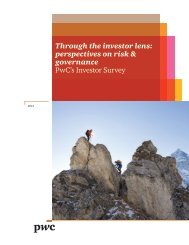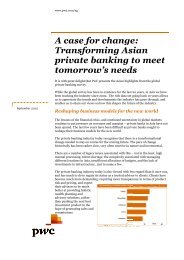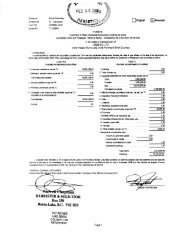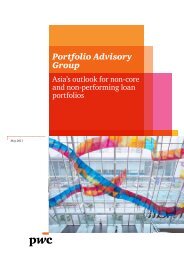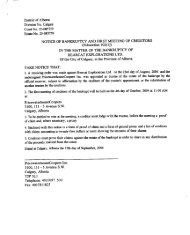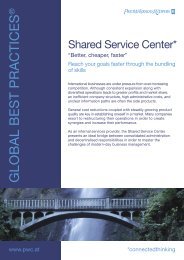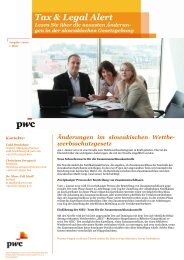Hoisting the sails - PwC
Hoisting the sails - PwC
Hoisting the sails - PwC
Create successful ePaper yourself
Turn your PDF publications into a flip-book with our unique Google optimized e-Paper software.
pwc.com<br />
© 2008 48 PricewaterhouseCoopers. All rights reserved. ‘PricewaterhouseCoopers’ refers to <strong>the</strong> network of member firms of PricewaterhouseCoopers International Limited, PricewaterhouseCoopers<br />
each of which is a<br />
separate and independent legal entity.
Transportation & Logistics<br />
<strong>Hoisting</strong> <strong>the</strong><br />
<strong>sails</strong>*<br />
Global Shipping & Ports<br />
Capability Statement<br />
*connectedthinking
2 PricewaterhouseCoopers
Introduction<br />
The Transportation & Logistics industry forms <strong>the</strong> back bone of global supply<br />
chains. The shipping industry plays a dominant role as 90% of world trade<br />
is seaborne. Without shipping <strong>the</strong> import and export of goods on <strong>the</strong> scale<br />
necessary for <strong>the</strong> modern world would not be possible. There are around 50,000<br />
merchant ships trading internationally, transporting every kind of cargo. The world<br />
fleet is registered in over 150 nations, and manned by over a million seafarers of<br />
virtually every nationality.<br />
Ships are technically sophisticated, high value assets (larger high-tech vessels<br />
can cost over USD 150 million to build), and <strong>the</strong> operation of merchant ships<br />
generates an estimated annual income of over USD 380 billion in freight rates,<br />
representing about 5% of <strong>the</strong> total global economy.<br />
PricewaterhouseCoopers’ (<strong>PwC</strong>) Shipping & Ports practice has grown in step with<br />
<strong>the</strong> industry, supporting our clients through industry restructurings, regulatory<br />
transformations, technological advances and changes in financial reporting and<br />
corporate governance requirements. Our experience and network of dedicated<br />
shipping industry practitioners positions <strong>PwC</strong> to provide clients with quality audit<br />
and professional services uniquely tailored to large, global shipping and ports<br />
organisations. We have developed our Shipping and Ports expertise through<br />
working with <strong>the</strong> leading shipping and port companies in <strong>the</strong> world. We have<br />
a long-standing and proven track record in auditing and consulting within <strong>the</strong><br />
contexts of international shipping, ports, logistics and supply chain management.<br />
<strong>PwC</strong>’s service offerings are staffed with highly qualified, experienced individuals<br />
and leaders in our profession. We provide services for deep sea, short sea and<br />
inland shipping companies, port authorities and terminal operators in <strong>the</strong> areas:<br />
audit and assurance, business advisory and global tax.<br />
Our investment in <strong>the</strong> shipping and ports industry provides you with professionals<br />
who understand <strong>the</strong> nuances of your industry and bring a continually fresh<br />
perspective to your organisation. <strong>PwC</strong>’s response to your challlenges!<br />
Klaus-Dieter Ruske Michel Adriaansens<br />
Global Transportation & Global Shipping & Ports Leader<br />
Logistics Industry Leader<br />
<strong>Hoisting</strong> <strong>the</strong> <strong>sails</strong><br />
3
4 PricewaterhouseCoopers
Contents<br />
Our response to your challenges:<br />
1. Accounting, Reporting & Governance – Keeping your log book 6<br />
2. Asset management & Restructuring –<br />
Capitalising on your opportunities 10<br />
3. Fraud – Protect your shipment 14<br />
4. Customs – Sailing safely through rough waters 18<br />
5. Mergers & Acquisitions – Navigating deals 22<br />
6. International Tax Strategy – Choosing a profitable course 26<br />
7. Performance Improvement – Gateway to profit 32<br />
8. Integrated IT Systems – Automating <strong>the</strong> bridge 36<br />
9. Creating a sustainable business –<br />
Our responsibility to <strong>the</strong> maritime future 40<br />
Our position – piloting <strong>the</strong> fleet in <strong>the</strong> Shipping & Ports industry 44<br />
What differentiates us 46<br />
About <strong>PwC</strong> 47<br />
We are where you are 48<br />
<strong>Hoisting</strong> <strong>the</strong> <strong>sails</strong><br />
5
1 Accounting,<br />
Reporting<br />
& Governance<br />
‘Keeping your<br />
log book’<br />
6 PricewaterhouseCoopers
Accounting principles and Shipping and Ports<br />
Companies in <strong>the</strong> Shipping and Ports industry compete in<br />
a global environment, and may need to adhere to several<br />
different generally accepted accounting practices (GAAP)<br />
in <strong>the</strong>ir different areas of operation. Treatment of issues<br />
specific to <strong>the</strong> Shipping and Ports industry, such as <strong>the</strong> use<br />
of a component approach to ships (e.g. engines/ hauls) and<br />
terminals, calculating <strong>the</strong> residual value of ships, <strong>the</strong> use of<br />
special purpose entities for ships, and dry-dock accounting,<br />
may vary. O<strong>the</strong>r important areas where discrepancies<br />
can occur include government grants, lease contracts, on<br />
or off balance sheet financing arrangements, provisions<br />
for scheduled maintenance, and derivatives revenue<br />
recognition. We have specialists for different GAAPs<br />
available, all with deep knowledge in <strong>the</strong> Shipping & Ports<br />
industry. As <strong>the</strong> market leader in <strong>the</strong> Shipping & Ports sector<br />
and large-scale GAAP conversions, we are committed to<br />
helping companies like yours maximise <strong>the</strong> benefits of a<br />
certain GAAP and improve <strong>the</strong> quality of your GAAP reports.<br />
<strong>Hoisting</strong> <strong>the</strong> <strong>sails</strong><br />
1 Accounting, Reporting & Governance<br />
Based on our experience with numerous IFRS transitions<br />
and audits under IFRS, we have prepared “Full Steam<br />
Ahead with IFRS”, a report that addresses <strong>the</strong> major<br />
challenges faced by shipping companies that are applying<br />
International Financial Reporting Standards (IFRS). In this<br />
publication we highlight <strong>the</strong> key technical and business<br />
issues that Shipping and Port companies should address to<br />
get maximum benefit from implementing IFRS.<br />
High quality corporate reporting is too important to be<br />
determined solely by <strong>the</strong> shape of externally-imposed<br />
regulation. To stake <strong>the</strong>ir own claim to reporting excellence<br />
and public trust, Shipping and Ports companies must<br />
foster a culture that views reporting transparency as a<br />
worthy end in itself, independent of rules and regulations.<br />
At PricewaterhouseCoopers, we know what it takes to meet<br />
both <strong>the</strong> high standards of today’s regulatory reporting<br />
requirements and <strong>the</strong> even higher expectations of your<br />
stakeholder community. Wherever your company does<br />
business, we offer a wide spectrum of services to ensure<br />
your corporate reporting is clear, complete, and relevant.<br />
Reporting corporate performance in Shipping and Ports<br />
Understanding <strong>the</strong> GAAPs of each country in which you operate is no longer sufficient to ensure<br />
adequate reporting. Complex regulations such as Sarbanes-Oxley as well as <strong>the</strong> continuing proliferation<br />
of guidance and regulations relating to ‘narrative’ reporting accompanying financial statements, have<br />
made <strong>the</strong> task even more challenging for Shipping and Ports companies.<br />
Investors today are on guard against reporting that meets regulatory requirements, but fails to provide a<br />
fully transparent view of a company’s health and prospects. Increasingly, investors also want companies<br />
to report on a broad set of non-financial measures, which, combined with financial reporting, might<br />
provide a better basis for judging corporate performance.<br />
7
PricewaterhouseCoopers Accounting & Reporting<br />
services and solutions include:<br />
• Audit of financial reports<br />
• IPO advice and assistance<br />
• Compliance with regulations and laws<br />
• Dealing with regulators<br />
• IFRS requirements<br />
• Non-financial and sustainability reporting<br />
(environmental, safety and social<br />
responsibility issues)<br />
• Sarbanes-Oxley Act<br />
• Transparency and increased disclosure<br />
• Transaction accounting and reporting<br />
• Understanding trends in corporate reporting<br />
• XBRL<br />
Hedging fuel price risk<br />
Shipping companies are structurally exposed to fuel price<br />
risks. Increasing fuel prices may impair <strong>the</strong> profitability<br />
going forward. When your functional currency or costs/<br />
revenues are o<strong>the</strong>r than USD you, as a shipping company,<br />
are also substantially exposed to USD risk on purchases<br />
of fuel since fuel is quoted in USD internationally. Shipping<br />
companies may also be exposed to foreign currency<br />
risks on <strong>the</strong> revenue side. Given high fuel prices, shipping<br />
companies are looking to increase <strong>the</strong>ir protection through<br />
<strong>the</strong> use of financial derivatives, ei<strong>the</strong>r locking-in future<br />
purchase prices on forecasted purchases of fuel with<br />
forward or swap contracts, or by entering into options to<br />
cap <strong>the</strong> forecasted purchase prices at maximum level, or<br />
within a range with a collar.<br />
PricewaterhouseCoopers risk services and<br />
solutions include:<br />
• Advise on and review risk management policies<br />
• Advise on and review processes, automation<br />
and internal controls<br />
• IAS 39/FAS 33, e.g. implementation of<br />
hedge accounting<br />
8 PricewaterhouseCoopers
<strong>Hoisting</strong> <strong>the</strong> <strong>sails</strong><br />
2 De bouwstenen van het toezicht<br />
9
2 Asset<br />
Management<br />
& Restructuring<br />
‘Capitalising on<br />
your opportunities’<br />
10 PricewaterhouseCoopers
Manage your shipping and ports assets smart<br />
The Shipping and Ports industry is extremely capital<br />
intensive, so well thought-out capital allocation decisions<br />
are essential to maintaining competitiveness.<br />
Investments in ships, infrastructure, ports, warehouses<br />
and terminals deal with a lot of money. Huge budgets are<br />
spent on new assets, replacements and maintenance.<br />
Developments in <strong>the</strong> environment make asset management<br />
more and more complex. Management must cope with<br />
huge challenges such as achieving higher asset utilisation,<br />
decreasing capital and operational expenditures,<br />
managing risks efficiently and weighing <strong>the</strong> options<br />
for all stakeholders.<br />
Asset (lifecycle) management is <strong>the</strong> process of establishing<br />
an operating environment under which capital returns are<br />
improved through effective management of risks inherent<br />
in owning, managing and operating a large asset base.<br />
Companies may be an asset owner, asset manager, service<br />
provider, or some combination of <strong>the</strong>se roles.<br />
Companies need to take care to assess <strong>the</strong> expected<br />
benefits of spending (e.g. improvement of financial<br />
performance, availability, improvement of environmental<br />
performance of health and safety issues) to ensure that <strong>the</strong><br />
right investments are made. They also need to be prepared<br />
to document to stakeholders how <strong>the</strong>se investments create<br />
and increase value.<br />
Increasing transparency, decreasing cost, improving<br />
reliability and availability of assets and improving on<br />
performance in health, safety and environment are key<br />
goals of a considered approach to asset management.<br />
<strong>Hoisting</strong> <strong>the</strong> <strong>sails</strong><br />
2 Asset Management & Restructuring<br />
PricewaterhouseCoopers asset management services<br />
and solutions include:<br />
• Benchmarking of Asset, Maintenance and Service<br />
Management practices<br />
• Visioning overall Asset, Maintenance and Service<br />
Management function including organisation,<br />
processes, people and technology<br />
• Designing and implementing Asset, Maintenance<br />
and Service Management organisations, including<br />
roles and responsibilities<br />
• Analysis of and independent insight into <strong>the</strong> value<br />
drivers of <strong>the</strong> asset intensive business and <strong>the</strong><br />
underlying performance model<br />
• Identification of specific restructuring and<br />
privatisation projects<br />
• Support communication and change management<br />
work streams<br />
• Select Enterprise Asset Management systems and<br />
simulation (risk analysis) tools<br />
Restructuring & privatisation opportunities<br />
Ports are valuable assets for <strong>the</strong> national economy and<br />
hence, any changes in ownership need to be considered<br />
carefully and cautiously.<br />
There are many views on how port assets can be<br />
structured. Financial and legal restructuring of a port is<br />
a complex procedure with many decisions to be taken.<br />
PricewaterhouseCoopers has a unique ability to offer <strong>the</strong><br />
required blend of specific skills to structure and transfer<br />
ownership of <strong>the</strong> port assets.<br />
Our industry specialists have a profound knowledge of<br />
<strong>the</strong> various concepts of privatisation, corporatisation,<br />
commercialisation, and deregulation. These concepts rely<br />
on instruments such as licenses and concessions, leasehold<br />
11
contracts, Build-Operate-Transfer, Build-Operate-Finance-<br />
Transfer, Build-Operate-Own, and o<strong>the</strong>r arrangements.<br />
Our approach for <strong>the</strong> restructuring of <strong>the</strong> port is a process<br />
which aims to maximise <strong>the</strong> important advantages for <strong>the</strong><br />
different stakeholders including: <strong>the</strong> port authority, <strong>the</strong><br />
terminal operators, <strong>the</strong> port customers, and <strong>the</strong> national<br />
government and economy.<br />
More and more, port authorities are set up as separate<br />
companies, operating more independently from<br />
government authorities. This development may ultimately<br />
involve privatisation.<br />
PricewaterhouseCoopers restructuring services<br />
and solutions include:<br />
• Assessing <strong>the</strong> strategic tasks to be performed by<br />
port authorities<br />
• Designing <strong>the</strong> operational structure for new entities<br />
• Assisting in defining <strong>the</strong> elements to be handed<br />
over to <strong>the</strong> private sector and <strong>the</strong> responsibilities<br />
and assets to be kept in hand of public authorities<br />
• Valuation of companies to be privatised<br />
• Evaluating feasibility of restructuring and<br />
privatisation projects<br />
• Evaluating expected returns on investment<br />
Public Private Partnerships (PPP)<br />
The ‘infrastructure gap’ and its negative impact on<br />
economic growth, job creation and social cohesion globally<br />
have been recognised for many years. The need to improve<br />
and expand infrastructure and suprastructure in ports<br />
(like cranes, quays and railways) is seen as a necessary<br />
condition to successful economic growth. However,<br />
governments have limited financial resources to devote to<br />
increased capital expenditure for improving and expanding<br />
infrastructure and suprastructure and face restrictions on<br />
<strong>the</strong>ir ability to raise debt.<br />
In order to bridge <strong>the</strong> growing gap between <strong>the</strong> cost of<br />
<strong>the</strong>se projects needed and <strong>the</strong> resources available, and<br />
to ensure that <strong>the</strong> infrastructure is delivered as efficiently<br />
and cost-effectively as possible, <strong>the</strong> key question is how<br />
to deliver cost-efficient investment. In this context, Public<br />
Private Partnerships (“PPPs”) are a growing element of<br />
public sector procurement across <strong>the</strong> globe.<br />
We believe that Public Private Partnerships offer a viable<br />
alternative to traditional procurement methods and we<br />
would like to see <strong>the</strong> public and private sectors doing<br />
more business toge<strong>the</strong>r. <strong>PwC</strong> has substantial experience<br />
in advising both <strong>the</strong> public sector and private companies<br />
in structuring, financing and managing huge infrastructure<br />
projects.<br />
PricewaterhouseCoopers PPP services<br />
and solutions include:<br />
• PricewaterhouseCoopers has extensive experience<br />
of working with both governments and private<br />
sector bidders.<br />
• We help <strong>the</strong> public sector develop <strong>the</strong> right<br />
approach to procurement.<br />
• We help private sector partners to get <strong>the</strong> best<br />
out of <strong>the</strong> process.<br />
• As an independent adviser, we have advised on<br />
more PPPs than any o<strong>the</strong>r professional services<br />
organisation and have specialist knowledge of<br />
deals in all sectors including transport, housing,<br />
education, health, defence, water and waste.<br />
12 PricewaterhouseCoopers
Tailored Industry Publications<br />
<strong>Hoisting</strong> <strong>the</strong> <strong>sails</strong><br />
Maximising Opportunites at your port of call<br />
We understand our clients operate in a global business<br />
environment and are confronted with many new<br />
opportunities. They are challenged to define <strong>the</strong> according<br />
strategic responses to turn <strong>the</strong>ir overall strategic vision into<br />
reality. In our paper ‘Maximizing Opportunities at your port<br />
of call’ we provide you an extensive overview of our<br />
services and experiences in advising ports on how to<br />
maximise opportuntities.<br />
Delivering <strong>the</strong> PPP Promise<br />
PricewaterhouseCoopers’ white paper, Delivering <strong>the</strong><br />
PPP promise, identifies some of <strong>the</strong> key issues raised<br />
by PPP projects and suggests appropriate solutions.<br />
Essentially, delivering <strong>the</strong> PPP promise, delivering solutions<br />
that fund new roads, improve rail services and expand and<br />
improve ports more quickly and efficiently.<br />
Trans-European Transport Network<br />
Our paper on <strong>the</strong> Trans-European Transport Network<br />
deals with <strong>the</strong> key challenges that EU countries are<br />
facing in realising necessary investments, co-ordinating<br />
investment among member states, and financing <strong>the</strong><br />
construction and operations of <strong>the</strong> infrastructure.<br />
2 Asset Management & Restructuring<br />
13
3 Fraud<br />
‘Protecting your<br />
shipment’<br />
14 PricewaterhouseCoopers
Managing fraud risks<br />
in <strong>the</strong> Shipping & Ports industry<br />
Fraud has continued making headlines into <strong>the</strong> 21st century,<br />
yet many executives still believe that “fraud can’t happen in<br />
my company”. But fraud does happen, and often – nearly<br />
half (45%) of organisations in <strong>the</strong> Transportation & Logistics<br />
industry report having experienced fraud over <strong>the</strong> past two<br />
years, and <strong>the</strong> actual incidence of fraud may be even higher,<br />
as detection can be difficult.<br />
Fraud schemes in Shipping & Ports are manifold.<br />
Straightforward examples such as manipulation of financial<br />
statements, commercial bribery and cash skimming may<br />
occur as in any o<strong>the</strong>r industry sector and need to be<br />
addressed at <strong>the</strong> top management level. More specifically,<br />
<strong>the</strong> shipping and ports industry is susceptible to:<br />
• Cargo <strong>the</strong>ft and o<strong>the</strong>r types of misappropriation of<br />
assets – <strong>the</strong> most prevalent type of fraud in this industry<br />
• Revenue leakage – likely to happen if shipping, billing<br />
and revenue recognition functions are not linked for<br />
all operations<br />
• Unsupported payments – as shipping companies<br />
operate in a large number of countries with various<br />
business cultures, <strong>the</strong>re is an inherent risk of <strong>the</strong>se kinds<br />
of payments, which may be in contradiction to laws and<br />
regulations<br />
• Falsification of shipping and customs papers – leading<br />
to shipping companies finding <strong>the</strong>mselves liable for VAT,<br />
import duties, excise and even penalties on shipment<br />
• Carousel fraud, also referred to as <strong>the</strong> “VAT merrygo-round”<br />
– taking advantage of <strong>the</strong> opportunities for<br />
falsification which arises when goods are shipped<br />
across borders<br />
<strong>Hoisting</strong> <strong>the</strong> <strong>sails</strong><br />
Managing <strong>the</strong> threat –<br />
how to take action against fraud<br />
3 Fraud<br />
Executives can reduce <strong>the</strong> risk of serious fraud by fostering<br />
a culture of honesty and high ethics, implementing a<br />
code of conduct supported by a whistle blowing system,<br />
evaluating and improving anti-fraud processes and<br />
control activities – as diverse as approvals, authorisations,<br />
verifications, reconciliations, segregation of duties,<br />
reviews of operating performance and security of assets<br />
– and developing an appropriate oversight process.<br />
Management should evaluate whe<strong>the</strong>r appropriate internal<br />
controls have been implemented in any area identified as<br />
posing higher risk, as well as controls over <strong>the</strong> financial<br />
reporting process. Controls is <strong>the</strong> core competence of<br />
PricewaterhouseCoopers. Combined with our profound<br />
understanding of <strong>the</strong> industry, we can support Boards of<br />
Directors and management in designing and implementing<br />
appropriate risk management and control systems.<br />
In addition, our risk management and forensic experts<br />
can help you minimise <strong>the</strong> risk of fraud and deal with it<br />
effectively once a case of misconduct is presumed or<br />
has occurred.<br />
15
PricewaterhouseCoopers antifraud services<br />
and solutions include:<br />
• Identification and assessment of fraud risk using a<br />
specially developed analytical tool, Fraud Scan ®<br />
• Expert investigation where fraudulent (suspicious/<br />
criminal) actions are suspected<br />
• Forensic acquisition and analysis of electronic<br />
evidence and document management<br />
• Quantifying losses<br />
• Analysis of <strong>the</strong> company’s individual risk structure<br />
• Restructuring of business processes for<br />
crime prevention<br />
• Design and improvement of internal<br />
control mechanisms<br />
• Optimisation of sensitive IT systems<br />
• Introduction of communication and<br />
prevention strategies<br />
• Internal staff training on actions to take when fraud<br />
is suspected<br />
• Advice and assistance on securing and<br />
recovering assets<br />
• Analysis of cash and payment flows<br />
• Preparation of factual statements that are<br />
admissible to court<br />
• Investigation into potential breaches of <strong>the</strong> laws<br />
against money-laundering<br />
• Presentation of independent expert evidence<br />
• Support in drafting company specific codes<br />
of ethics<br />
16 PricewaterhouseCoopers
Tailored Industry Publications<br />
<strong>Hoisting</strong> <strong>the</strong> <strong>sails</strong><br />
Protect your shipment<br />
Supporting Transportation & Logistics companies in managing fraud risks<br />
Fraud has continued making headlines into <strong>the</strong> 21st century, yet many executives still believe that<br />
“fraud can’t happen in my company”. But fraud does happen, and often – nearly half (45%) of<br />
organisations in <strong>the</strong> Transportation & Logistics industry report having experienced fraud over <strong>the</strong><br />
past two years, and <strong>the</strong> actual incidence of fraud may be even higher, as detection can be difficult.<br />
This report will outline some of <strong>the</strong> most common fraud schemes in <strong>the</strong> Transportation & Logistics<br />
industry and provide suggestions on combating fraud. Where relevant we have also incorporated<br />
industry-specific insights from <strong>the</strong> results of our Global Economic Crime Survey 2005.<br />
Predicting <strong>the</strong> unpredictable<br />
Protecting Transportation & Logistics companies against fraud, reputation and misconduct risk<br />
The potential for corporate fraud and misconduct to easily spread from a small brush fire into a<br />
full-blown firestorm has garnered <strong>the</strong> attention of regulators, with <strong>the</strong> Unites States SEC, <strong>the</strong> Public<br />
Company Accounting Oversight Board and <strong>the</strong> Federal Sentencing Commission all having recently<br />
addressed this topic. While it may not be possible to eliminate <strong>the</strong> risk of fraud altoge<strong>the</strong>r, a company<br />
can at least identify it early and minimize its damage with proper planning, policies and procedures.<br />
This report provides step-by-step guidance on how to develop an effective antifraud program that<br />
addresses not only financial statement risk, but equally important reputation, operational, legal<br />
and strategic risks. In addition, it provides a summary of fraud schemes that are common to <strong>the</strong><br />
Transportation & Logistics industry.<br />
3 Fraud<br />
Global Economic Crime Survey<br />
PricewaterhouseCoopers regularly surveys companies’ experiences with economic crime. The biennial<br />
Global Economic Crime Survey is <strong>the</strong> most comprehensive investigation of this kind. With over eight<br />
years of data on trends, perceptions and incidents of fraud, PricewaterhouseCoopers’ Global Economic<br />
Crime Survey 2007 points to <strong>the</strong> continued evidence of <strong>the</strong> intractability of fraud. Entitled Economic<br />
crime: People, culture and controls <strong>the</strong> report reveals that internal controls alone are not enough to fight<br />
it. Instead, controls must be backed by a strong ethical company culture, a broad risk management<br />
programme, and “zero tolerance” of executives or o<strong>the</strong>r employees who commit economic crimes.<br />
This year’s survey is based on months of interviews of over 5,400 companies located in 40 countries.<br />
It is <strong>the</strong> largest, most comprehensive international survey of economic crime.<br />
17
4 Customs<br />
‘Sailing safely<br />
through rough waters’<br />
18 PricewaterhouseCoopers
Customs compliance<br />
For shipping companies involved in international trade,<br />
proper management of customs compliance is critical to a<br />
successful operation. Accordingly, companies must develop<br />
comprehensive guidelines for compliance with import and<br />
export requirements, while employing strategies to reduce<br />
<strong>the</strong> costs of compliance on a worldwide basis.<br />
One of <strong>the</strong> common challenges facing shipping and ports<br />
companies is <strong>the</strong> inability to determine a complete and<br />
current “footprint” of <strong>the</strong>ir import and export compliance.<br />
This is, in part, due to <strong>the</strong> decentralisation of customs<br />
compliance within most companies and <strong>the</strong> use of<br />
independent customs brokers, which results in <strong>the</strong> inability<br />
of implementing uniform control procedures. If a company<br />
does not have a comprehensive understanding of its<br />
customs function, it may experience many customs claims,<br />
more supply chain interruption, and increased overall<br />
costs and an inability to systematically identify cost saving<br />
opportunities and potential areas of risk.<br />
PricewaterhouseCoopers customs compliance<br />
services and solutions include:<br />
• Assisting companies with <strong>the</strong> development and<br />
implementation of a global customs compliance<br />
management strategy.<br />
• Helping companies to develop insightful import<br />
and export strategies which may reduce customs<br />
liabilities, while integrating <strong>the</strong> compliance process<br />
into overall business operations.<br />
Authorised Economic Operator (AEO)<br />
AEO is an European Commission (EC) initiative that requires<br />
companies to maintain high levels of security throughout<br />
<strong>the</strong>ir supply chain in order to gain recognition from customs<br />
that <strong>the</strong>y are a secure trader and obtain <strong>the</strong> associated<br />
<strong>Hoisting</strong> <strong>the</strong> <strong>sails</strong><br />
4 Customs<br />
privileges. The EC has issued guidelines that allow shipping<br />
companies to carry out detailed self-audits to demonstrate<br />
that <strong>the</strong>y comply with <strong>the</strong> requirements before submitting<br />
a formal application. This will often be followed by a<br />
detailed audit from <strong>the</strong> corresponding customs authorities.<br />
Companies are also likely to be asked to demonstrate that<br />
<strong>the</strong>re are adequate controls and processes in place to<br />
manage declarations of valuation, origin and classification.<br />
AEO is of major interest to shipping companies importing or<br />
exporting goods into and out of <strong>the</strong> EU. A company must be<br />
established in <strong>the</strong> EU and have a good compliance review<br />
record to qualify. Companies must consider whe<strong>the</strong>r AEO is<br />
appropriate to <strong>the</strong>ir model and where it is, should consider<br />
when <strong>the</strong>y want to be authorised.<br />
Benefits will be provided to those operators who comply<br />
with <strong>the</strong> security and safety requirements contained in <strong>the</strong><br />
AEO legislation. Benefits include customs simplification<br />
and security facilitation. An Authorized Economic Operator<br />
must comply with financial and customs reliability in order<br />
to benefit from customs simplification. Compliance with<br />
<strong>the</strong> customs simplification in addition to specific security<br />
standards and requirements is necessary to benefit from<br />
security facilitation.<br />
PricewaterhouseCoopers AEO services and<br />
solutions include:<br />
An initial review to identify a company’s eligibility<br />
and <strong>the</strong> benefits and obstacles faced in obtaining<br />
certification, including:<br />
• High level customs profile and supply chain<br />
review to identify any gaps between legislative<br />
requirements, EU guideline requirements and a<br />
company’s procedures.<br />
• Assistance in implementing <strong>the</strong> processes required<br />
for AEO certification as well as providing specific<br />
tax and legal advice on complex issues.<br />
19
Customs-Trade Partnership Against Terrorism<br />
In response to <strong>the</strong> increased focus on security in <strong>the</strong> United<br />
States, <strong>the</strong> US Bureau of Customs and Border Protection<br />
(Customs), is operating with a new emphasis on security.<br />
Accordingly, Customs has initiated <strong>the</strong> Customs-Trade<br />
Partnership Against Terrorism (C-TPAT) program. The focus<br />
of C-TPAT is on importing companies’ supply chains, and<br />
<strong>the</strong> security measures put in place to prevent terrorist<br />
penetration. Customs is strongly encouraging all importers<br />
to join C-TPAT and has announced benefits for those<br />
shipping companies that volunteer to comply.<br />
PricewaterhouseCoopers C-TPAT services and<br />
solutions include:<br />
• Assisting companies with admittance and<br />
compliance to C-TPAT. In order to be admitted<br />
to C-TPAT, companies must engage in<br />
self-assessments, security reviews, and<br />
program development.<br />
• Helping shipping companies compile <strong>the</strong> required<br />
data and complete <strong>the</strong> application and agreements<br />
that are a pre-requisite to signing up for <strong>the</strong><br />
C-TPAT program.<br />
By using our developed approach to C-TPAT, your company<br />
may more quickly experience C-TPAT benefits, which<br />
include a reduced number of cargo inspections, expedited<br />
inspections, and increased supply chain efficiency.<br />
20 PricewaterhouseCoopers
Tailored Industry Publications<br />
<strong>Hoisting</strong> <strong>the</strong> <strong>sails</strong><br />
Customs Bulletin<br />
PricewaterhouseCoopers regulary distributes a Custom Bulletin on a monthly basis. Authorised<br />
Economic Operator including all legislative updates are hosted in <strong>the</strong>se publications.<br />
4 Customs<br />
Independent Verification of C-TPAT Cargo Security Controls<br />
A private sector, third party verification process has been successful in several government policy<br />
initiatives. This white paper proposes a similar solution to reduce <strong>the</strong> risk that terrorists will exploit<br />
legitimate trade and <strong>the</strong> intermodal container to attack <strong>the</strong> United States using a weapon of mass<br />
destruction. By embedding a private sector, third-party verification process in <strong>the</strong> Custom-Trade<br />
Partnership Against Terrorism (C-TPAT) program, <strong>the</strong> United States can be better protect and expedite<br />
<strong>the</strong> transport of cargo through its ports.<br />
21
5 Mergers<br />
& Acquisitions<br />
‘Navigating Deals’<br />
22 PricewaterhouseCoopers
Increased acquisition activities within <strong>the</strong><br />
Shipping and Ports industry<br />
Consolidation and a push towards vertical integration are<br />
driving increased acquisition activities in both <strong>the</strong> Shipping<br />
and Ports sectors. Shipping companies are investing heavily<br />
in port terminals, while ports are investing in hinterland<br />
connections like train companies and inland ports.<br />
How do you make a smart deal in <strong>the</strong> Shipping and Ports<br />
industry? First, start with your deal strategy – it has to be<br />
flexible enough to adjust for <strong>the</strong> unexpected, aggressive<br />
enough to win highly competitive business terms, and broad<br />
enough to envision <strong>the</strong> challenges that will confront you<br />
from <strong>the</strong> moment <strong>the</strong> contract is signed. As you move down<br />
<strong>the</strong> path toward reaching agreement on your deal, you will<br />
also need access to <strong>the</strong> right information at <strong>the</strong> right time.<br />
Tax issues, legal risks, conflicts of interest, fluctuations in<br />
<strong>the</strong> shipping and ports markets – all need to be taken into<br />
account with each decision you make.<br />
However, in a business environment where information can<br />
easily overwhelm and confuse – which advisor can help you<br />
fashion a deal that works? To start, look for someone with<br />
sufficient experience and judgment in M&A in <strong>the</strong> Shipping<br />
and Ports industry. Plenty of patience and stamina is also<br />
recommended, as is <strong>the</strong> capability to add value across<br />
<strong>the</strong> entire deal-making continuum, from strategy through<br />
post-deal integration.<br />
At PricewaterhouseCoopers, we fulfill that description.<br />
We offer a full range of tax, financial, business assurance,<br />
and advisory capabilities covering acquisitions, disposals,<br />
private equity, strategic M&A advice, advice on listed<br />
company transactions, financing, and public/private<br />
partnerships. We’re also able to deploy experienced deal<br />
teams – combining Shipping and Ports industry knowledge<br />
with local market expertise – anywhere and everywhere your<br />
company operates. And while every deal is unique in detail,<br />
most will benefit from <strong>the</strong> broad experience we bring in<br />
<strong>Hoisting</strong> <strong>the</strong> <strong>sails</strong><br />
5 Mergers & Acquisitions<br />
<strong>the</strong> areas of due diligence, tax, and, where permitted, legal<br />
advice. In short, we offer integrated solutions with deep<br />
Shipping and Ports experience precisely matched to your<br />
particular deal situation.<br />
PricewaterhouseCoopers M&A services<br />
and solutions include:<br />
• Accessing <strong>the</strong> capital markets and IPOs<br />
• Acquisitions, joint ventures, and alliances<br />
• Downsizing and carve outs<br />
• Transaction risks<br />
• Deal execution<br />
• Deal origination<br />
• Valuation of assets<br />
• Preparing of business plans and financial<br />
modeling of projections<br />
• Capital raising, debt raising and private<br />
equity financing<br />
• Project managing o<strong>the</strong>r advisers (e.g., lawyers,<br />
due diligence providers, etc.)<br />
• Exit strategy reviews<br />
•<br />
Due Diligence<br />
23
Tailored Industry Publications<br />
Tailored Industry Publications<br />
Transportation and Logistics<br />
Intersections*<br />
Global Transportation and Logistics Transactions Analysis<br />
Third quarter 2007<br />
*connectedthinking<br />
Global Sourcing<br />
<strong>PwC</strong> services alongside <strong>the</strong> “deal continuum”<br />
Grouping expertise toge<strong>the</strong>r for one integrated service through <strong>the</strong> deal<br />
�<br />
�<br />
�<br />
�<br />
Deal flow<br />
Bid support<br />
Investment banking<br />
advice<br />
Strategy evaluation<br />
Collaborate and Innovate:<br />
a new world of sourcing*<br />
Identifying<br />
deals<br />
�<br />
�<br />
�<br />
�<br />
�<br />
�<br />
�<br />
Evaluating<br />
deals<br />
No-access due<br />
diligence<br />
Deal strategy validation<br />
Value driver<br />
identification<br />
Target evaluation<br />
(indicative)<br />
Synergy assessment<br />
Pre-deal purchase price<br />
allocation<br />
How to succeed in outsourcing<br />
Intersections<br />
through streng<strong>the</strong>ned governance*<br />
This is a global report on <strong>the</strong> analysis of global Although transportation <strong>the</strong> number of companies and logistics transactions. The report<br />
pursuing strategic outsourcing<br />
is published on a quarterly basis, examining some of <strong>the</strong> global trends in <strong>the</strong> industry and provides<br />
initiatives continues to rise,<br />
charts and commentary that support our point of view on <strong>the</strong>se trends.<br />
Intersections*<br />
This is a global report on <strong>the</strong><br />
analysis of global transportation<br />
and logistics transactions. The<br />
report will be published on a<br />
quarterly basis, examining some of<br />
<strong>the</strong> global trends in <strong>the</strong> industry and<br />
provides charts and commentary<br />
that support our point of view on<br />
<strong>the</strong>se trends.<br />
Pre Deal First 100 days Transformation<br />
Collaborate & Innovate:<br />
a new world of sourcing*<br />
Outsourcing is growing fast and<br />
delivering results. It is covering<br />
more parts of <strong>the</strong> business<br />
landscape, and gaining in<br />
complexity. Many challenges<br />
remain. Today’s market leaders<br />
are embracing collaboration and<br />
transparency to achieve <strong>the</strong> promise<br />
of productivity and performance in<br />
<strong>the</strong> outsourcing enterprise. In <strong>the</strong><br />
spirit of collaboration, we invite you<br />
to share your experiences.<br />
�<br />
�<br />
�<br />
�<br />
�<br />
�<br />
�<br />
�<br />
�<br />
�<br />
Executing<br />
deals<br />
Financial DD<br />
Commercial DD<br />
Operational DD<br />
Deal structuring<br />
Negotiation support<br />
Financing advice<br />
Legal services<br />
Tax and human<br />
resources issues<br />
Completion accounts<br />
SPA support<br />
studies reveal that as many as<br />
half of <strong>the</strong>se investments fail to<br />
return <strong>the</strong> benefits executives<br />
expect. Even a quick glance at <strong>the</strong><br />
portfolio of risks that can derail<br />
an outsourcing initiative begins to<br />
provoke questions about how to<br />
manage outsourcing uncertainty<br />
– across political and country risk,<br />
contractual risk, operational risk, and cultural risk. Common<br />
reasons for outsourcing failures vary widely, but each can be<br />
traced back to a fundamental lapse in managerial oversight and<br />
control – in effect, to a failure in governance.<br />
In this Whitepaper, we examine <strong>the</strong> most effective way to<br />
manage outsourcing risk. This White paper outlines <strong>the</strong> steps for<br />
establishing <strong>the</strong>se centers of excellence and how to improve <strong>the</strong><br />
overall value of outsourcing initiatives.<br />
24 PricewaterhouseCoopers<br />
�<br />
�<br />
�<br />
�<br />
�<br />
�<br />
�<br />
�<br />
�<br />
�<br />
Making deals<br />
successful<br />
Post merger integration<br />
Synergy review<br />
Operational improvements<br />
Purchase price allocation<br />
(IFRS / US GAAP)<br />
Accounting<br />
Integration support<br />
Finance Function<br />
Effectiveness<br />
Governance, Risk &<br />
Compliance<br />
Restructuring,<br />
reorganisation<br />
Structuring employee<br />
benefits schemes<br />
�<br />
�<br />
�<br />
�<br />
�<br />
�<br />
�<br />
Consider Channel 1 independence restrictions!<br />
Harvesting<br />
deals<br />
Portfolio review<br />
Vendor assistance<br />
Sell-side DDCarve-outs<br />
Capital markets<br />
IPO advice<br />
Buyer identification<br />
Investment banking advice
<strong>Hoisting</strong> <strong>the</strong> <strong>sails</strong><br />
1 Titel<br />
25
6 International<br />
Tax Strategy<br />
‘Choosing<br />
a profitable course’<br />
26 PricewaterhouseCoopers
Managing tax risks and facing <strong>the</strong> challenges<br />
Emerging governance and ethical standards require<br />
shipping companies to put more emphasis on managing<br />
risk. At <strong>the</strong> same time, regulatory pressures related to<br />
accounting and reporting transparency have made timely<br />
disclosure of liabilities, contingencies and internal control<br />
processes an issue of <strong>the</strong> highest importance. Surprisingly<br />
though, tax all too often remains a ‘black box’ – impervious<br />
to close scrutiny by investors and analysts. Never<strong>the</strong>less, a<br />
company’s approach to tax strategy and risk management<br />
has an important impact on its perceived value and should<br />
be a key area of focus for any company concerned about<br />
maintaining its reputation.<br />
Unfortunately, for a variety of reasons, tax matters are often<br />
not dealt with in a systematic way. There may be no clear<br />
tax strategy in place; any tax objectives or related policies or<br />
manuals; or <strong>the</strong> tax function itself may be poorly organised.<br />
As a consequence, tax opportunities are lost and risks are<br />
identified too late. This is a particular danger in <strong>the</strong> Shipping<br />
industry, where exposure to corporate tax claims is often<br />
high and non-compliance with transaction taxes such as<br />
VAT and customs rules can effectively put a company out<br />
of business.<br />
Through our shipping industry experience and<br />
expertise we can help you realise <strong>the</strong> best services<br />
and solutions to some of <strong>the</strong> key tax challenges:<br />
• Optimise your worldwide tax position by taking<br />
a global view of your business<br />
• Manage <strong>the</strong> many company and employee<br />
taxation risks associated with cross-border<br />
operations and employment<br />
• Develop a company’s global tax strategy and<br />
design a tax risk management model<br />
• Assess tax risks in M&A situations<br />
• Enhance control of your compliance globally<br />
• Lowering <strong>the</strong> cost of capital<br />
<strong>Hoisting</strong> <strong>the</strong> <strong>sails</strong><br />
VAT and o<strong>the</strong>r indirect taxes<br />
Value Added Tax (VAT) is a broadly-based transaction<br />
tax on goods and services, and all European Union (EU)<br />
countries are required to operate a VAT system as part of<br />
<strong>the</strong>ir membership obligations. Many non-EU countries also<br />
operate a VAT system. The VAT issue can be extremely<br />
complex, widely due to constant changes in legislation<br />
leading to unforeseen liabilities. Moreover, shipping<br />
companies are potentially subject to a number of o<strong>the</strong>r<br />
indirect taxes such as freight taxes. Unless shipping<br />
companies manage <strong>the</strong>ir VAT and o<strong>the</strong>r indirect taxes,<br />
<strong>the</strong>ir profitability will decrease whilst working capital<br />
requirements (cash flow) and risks increase.<br />
Managing tonnage tax<br />
6 International Tax Strategy<br />
PricewaterhouseCoopers VAT/indirect taxes services<br />
and solutions include:<br />
• Review of <strong>the</strong> compliance of your import/ export<br />
flows with <strong>the</strong> VAT obligations and <strong>the</strong> existence of<br />
planning opportunities<br />
• Assistance in <strong>the</strong> application/implementation of<br />
VAT procedures and processes<br />
The shipping industry and its related activities are generally<br />
in good shape worldwide. A high demand for cargo space<br />
and strong international investment in new vessels led to an<br />
above average growth over <strong>the</strong> last few years.<br />
Particularly in Asia <strong>the</strong> shipping industry has developed a<br />
strong base, while Europe is trying to maintain its position.<br />
In this respect favourable tax and o<strong>the</strong>r incentives play<br />
an important role. One of <strong>the</strong> most important incentives<br />
has been <strong>the</strong> introduction of <strong>the</strong> favourable tonnage tax<br />
principle. Most European countries implemented a tonnage<br />
tax regime or o<strong>the</strong>r favourable tax regimes.<br />
27
The main advantage of <strong>the</strong> tonnage tax regimes is <strong>the</strong><br />
very low effective tax rate of sometimes less than 1%,<br />
when <strong>the</strong> shipping business is doing well. Tax payable is<br />
based on <strong>the</strong> registered tonnage of a vessel, multiplied<br />
by a fixed amount of deemed profit per ton, instead of <strong>the</strong><br />
actual accounting profits from <strong>the</strong> exploitation of a vessel.<br />
Never<strong>the</strong>less, <strong>the</strong> regimes differ in detail in calculation<br />
methods and concerning qualifying activities, ownership,<br />
lock up period, capital gains, flag requirement and<br />
management requirements. In <strong>the</strong> European Union, tonnage<br />
tax regimes are implemented in Belgium, Cyprus, Denmark,<br />
Finland, France, Germany, Greece, Ireland, Italy, Malta, <strong>the</strong><br />
Ne<strong>the</strong>rlands, Norway, Poland, Spain, Sweden (presumably<br />
sometime in 2008) and <strong>the</strong> UK.<br />
Only certain shipping activities qualify for a tonnage<br />
tax regime. Most tonnage tax regimes are applicable to<br />
‘maritime transport’: <strong>the</strong> transport of goods and persons by<br />
sea in international traffic. Under some tonnage tax regimes<br />
towage, dredging and/or ship management activities<br />
may also qualify. To qualify for a tonnage tax regime a<br />
shipping company must have a certain degree of ownership<br />
regarding <strong>the</strong> vessel. The required degree of ownership<br />
differs between <strong>the</strong> different tonnage tax regimes.<br />
PricewaterhouseCoopers tonnage tax services<br />
and solutions include:<br />
• Helping companies decide how to structure<br />
<strong>the</strong>ir shipping and o<strong>the</strong>r business<br />
• Advise companies with <strong>the</strong> selection of <strong>the</strong> most<br />
appropriate tonnage tax and o<strong>the</strong>r favourable tax regime<br />
International mobility and<br />
cross-border employment<br />
Enterprises active in <strong>the</strong> Shipping & Ports industry sector<br />
are typically faced with cross-border employment as a<br />
consequence of <strong>the</strong> multinational nature of <strong>the</strong>ir activities.<br />
An increasingly mobile workforce can create tax residence<br />
or permanent establishment problems. Every cross-border<br />
worker should be evaluated for immigration compliance<br />
to ensure <strong>the</strong> business is not inadvertently allowing staff<br />
to work abroad illegally. What’s more, cross-border<br />
employment involves a real risk of creating a permanent<br />
establishment, triggering severe tax reporting and financial<br />
repercussions. Specific local shipping wage tax and HR<br />
legislation might also result in large opportunities for<br />
shipping companies to benefit from.<br />
PricewaterhouseCoopers international mobility<br />
services and solutions include:<br />
• PricewaterhouseCoopers can advise on <strong>the</strong> most<br />
tax efficient HR solutions and help manage and<br />
control <strong>the</strong> various and numerous risks costefficiently,<br />
using in-house developed, highly<br />
sophisticated and automated tools.<br />
• The administrative burden will be taken away from<br />
<strong>the</strong> HR manager. You can entrust us with handling<br />
<strong>the</strong> whole international employment process –<br />
from work permit tracking over immigration case<br />
management to tax return preparation.<br />
Transfer pricing (TP)<br />
Inter-company transactions across borders are growing<br />
rapidly and are becoming much more complex. Transfer<br />
pricing is an important issue for <strong>the</strong> shipping industry.<br />
When ships cross international boundaries, compliance<br />
with <strong>the</strong> differing requirements of multiple overlapping tax<br />
jurisdictions is a complicated and time-consuming task.<br />
Tax authorities from each country are imposing stricter<br />
penalties, new documentation requirements, increased<br />
information exchange and increased audit/inspection<br />
activity, so accurate compliance is critical. At <strong>PwC</strong>, we<br />
have a strong international network of dedicated transfer<br />
pricing specialists with advanced training in economics,<br />
28 PricewaterhouseCoopers
accounting, law and project management and highly<br />
experienced in <strong>the</strong> Shipping and Ports industry ready to<br />
work with you.<br />
PricewaterhouseCoopers TP services and<br />
solutions include:<br />
• Documentation and planning<br />
• Dispute resolution<br />
•<br />
Advance pricing agreements (APAs)<br />
<strong>Hoisting</strong> <strong>the</strong> <strong>sails</strong><br />
6 International Tax Strategy<br />
29
Tailored Industry Publications<br />
Choosing a profitable course – European tonnage tax regimes for <strong>the</strong> shipping industry<br />
All tonnage tax regimes in Europe are based on <strong>the</strong> same principle – tax payable is based on <strong>the</strong><br />
registered tonnage of vessels, multiplied by a fixed amount of deemed profit per ton, instead of <strong>the</strong><br />
actual accounting profits. To facilitate shipping companies in making <strong>the</strong>ir choice for <strong>the</strong> optimal regime,<br />
PricewaterhouseCoopers compared <strong>the</strong> European tonnage tax systems for <strong>the</strong> shipping industry.<br />
This report gives you a detailed description of <strong>the</strong> differences between <strong>the</strong>m and calculation examples,<br />
as well as an outline of <strong>the</strong> background of <strong>the</strong> tonnage tax regimes.<br />
Tax Risk Management Guide<br />
This guide outlines firstly <strong>the</strong> issues that need to be discussed when a company is deciding on its policy<br />
and addressing its approach to tax risk management, secondly a framework for managing <strong>the</strong> risks and<br />
finally some specific tools and techniques that can be used in doing so. The guide addresses <strong>the</strong> need<br />
for key stakeholders to be comfortable that <strong>the</strong>re is a tax risk management policy in <strong>the</strong>ir organisation,<br />
that tax, as one of <strong>the</strong> key costs in <strong>the</strong> business is being properly managed and that <strong>the</strong> inherent risks in<br />
<strong>the</strong> tax position of <strong>the</strong> organisation are being both understood and properly controlled.<br />
Opportunities & Challenges in <strong>the</strong> Shipping Industry<br />
The PricewaterhouseCoopers tax shipping network is finalising <strong>the</strong> next version of its leaflet<br />
‘Opportunities and challenges for <strong>the</strong> shipping network’. The leaflet includes an overview of tonnage tax<br />
regimes and o<strong>the</strong>r tax systems applicable to shipping companies in 19 countries. The summary covers<br />
all key shipping nations in Europe as well as some of <strong>the</strong> key shipping countries outside Europe such as<br />
mainland China, Hong Kong and Singapore. Cyprus and Malta were added in <strong>the</strong> version published in<br />
November 2007.<br />
30 PricewaterhouseCoopers
<strong>Hoisting</strong> <strong>the</strong> <strong>sails</strong><br />
1 Titel<br />
31
7 Performance<br />
Improvement<br />
‘Gateway to profit’<br />
32 PricewaterhouseCoopers
Improving your performance<br />
We help <strong>the</strong> world’s most progressive Transportation<br />
and Logistics organisations, of all shapes and sizes, to<br />
continuously evolve and adapt in <strong>the</strong> face of a constantly<br />
changing and increasingly complex environment. We help<br />
our clients react with agility to opportunities and threats<br />
by delivering ongoing performance improvements to allow<br />
<strong>the</strong>m to gain and protect competitive advantage.<br />
Our performance improvement consultants offer<br />
services in <strong>the</strong> following areas:<br />
• Finance<br />
• Operations<br />
• People<br />
• Strategy<br />
•<br />
Technology<br />
Financial effectiveness<br />
Shipping and Port companies should be looking at building<br />
<strong>the</strong> processes, controls (yield-management) systems<br />
and staff capabilities that ultimately help to manage <strong>the</strong><br />
business better, both now and for <strong>the</strong> future. Management<br />
will raise questions like: How can we get more value from<br />
our company’s finance function? Does our finance function<br />
support our company’s business operations? What are <strong>the</strong><br />
key risks faced by our company – and are we effectively<br />
managing those risks? How do we spend less time retrieving<br />
and reporting information? Does our company have <strong>the</strong><br />
appropriate organisation in place to address compliance<br />
requirements? Have we got <strong>the</strong> right person in <strong>the</strong> right<br />
finance role?<br />
We work closely with clients to improve <strong>the</strong> effectiveness<br />
and efficiency of <strong>the</strong>ir companies’ finance operations. Our<br />
accounting, organisational and technology skills can help<br />
<strong>Hoisting</strong> <strong>the</strong> <strong>sails</strong><br />
enhance <strong>the</strong> core transaction processing and reporting<br />
competencies of <strong>the</strong> finance function, while streng<strong>the</strong>ning<br />
its ability to support management decision-making and<br />
corporate strategy.<br />
Maximising your revenues<br />
7 Performance Improvement<br />
PricewaterhouseCoopers financial effectiveness<br />
services and solutions include:<br />
• Finance reviews<br />
• Performance management<br />
• Consolidation and reporting<br />
• Treasury and working capital<br />
• Back office operations<br />
• People<br />
• Systems and tools<br />
• Risks and controls<br />
Shipping and Ports companies face significant challenges in<br />
recording and collecting all of <strong>the</strong> revenue to which <strong>the</strong>y are<br />
entitled. This is especially true because of <strong>the</strong> high volume<br />
of transactions and several locations of service delivery.<br />
Revenue leakage can occur in <strong>the</strong> following situations:<br />
• Billing and shipping terms are commonly tailored to fit<br />
customer needs. However, tiered pricing, incentives<br />
and discounts are not always communicated accurately<br />
between sales, operations and finance, resulting in<br />
errors and customer disputes.<br />
• Complex billing and shipping terms may not be<br />
accepted by downstream systems. Errors related to<br />
work-arounds or manual adjustments result in lost<br />
revenue or additional costs.<br />
• Failure to reconcile order-specific quantities, size and<br />
weight with actual picked-up or delivered items results<br />
in unbilled revenue or costly loss-related claims.<br />
• Incomplete or inaccurate shipping information often<br />
33
•<br />
•<br />
result in items not progressing to <strong>the</strong> next stage of<br />
delivery. Unresolved errors or omissions result in billing<br />
or collection difficulties.<br />
Incomplete or inaccurate manifests result in delayrelated<br />
costs.<br />
Unclear or inaccurate terms result in disputes between<br />
parties; third-party carriers often have no incentive to<br />
work with originating shippers to clear disputes over<br />
volume discounts and surcharges.<br />
PricewaterhouseCoopers works with shipping companies<br />
to address <strong>the</strong>se challenges, helping clients implement new<br />
sales management processes that eliminate service delivery<br />
at below-margin price points and metrics that prevent sales<br />
teams from receiving commissions for unprofitable sales.<br />
Identify Quantify Capture<br />
Identifies where you<br />
are leaking revenue<br />
and diagnoses<br />
critical problems.<br />
Quantifies how<br />
much you can<br />
capture and<br />
evaluates <strong>the</strong><br />
ROI of recovering<br />
<strong>the</strong> revenue.<br />
Maximizer Solutions<br />
Shared service centres, outsourcing and<br />
off-shoring<br />
Captures <strong>the</strong><br />
revenue by<br />
implementing<br />
proven solutions.<br />
Centralising back office functions like order intake,<br />
planning, accounts payable, accounts receivable and<br />
financial accounting/reporting can often be an effective<br />
cost reduction strategy. For shipping companies who are<br />
operating in a wide variety of locations worldwide however,<br />
centralising may be a good alternative to improve overall<br />
quality of services and make processes more efficient.<br />
Companies may also want to consider off-shoring in<br />
a country with relatively low labour costs. Centralising<br />
services and off-shoring are very complex projects which<br />
require significant advance planning. Management needs<br />
to consider how to make <strong>the</strong> case for shared services, what<br />
processes to include, and where <strong>the</strong> shared service centre<br />
should be located.<br />
Companies also need to ensure that <strong>the</strong>y can manage<br />
<strong>the</strong> customer/service provider relationship and ensure<br />
<strong>the</strong> delivery of appropriate service levels. In addition,<br />
<strong>the</strong> organisation model, required technology and<br />
implementation approach should be considered.<br />
PricewaterhouseCoopers services and<br />
solutions include:<br />
• Feasibility study<br />
• Selection of possible locations<br />
• Developing implementation plans<br />
• Performance reviews (post implementations<br />
reviews, benchmarking, audit and redesigns<br />
of shared services centres)<br />
• Dismantle of shared service centres<br />
34 PricewaterhouseCoopers
Tailored Industry Publications<br />
How to<br />
succeed in<br />
outsourcing<br />
through<br />
streng<strong>the</strong>ned<br />
governance*<br />
*connectedthinking<br />
<strong>Hoisting</strong> <strong>the</strong> <strong>sails</strong><br />
7 Performance Improvement<br />
Collaborate & Innovate – A new world of sourcing<br />
Outsourcing is growing fast and delivering results. It is covering more parts of <strong>the</strong> business landscape,<br />
and gaining in complexity. Many challenges remain. Today’s market leaders are embracing collaboration<br />
and transparency to achieve <strong>the</strong> promise of productivity and performance in <strong>the</strong> outsourcing enterprise.<br />
In <strong>the</strong> spirit of collaboration, we invite you to share your experiences.<br />
How to succeed in outsourcing through streng<strong>the</strong>ned governance<br />
Although <strong>the</strong> number of companies pursuing strategic outsourcing initiatives continues to rise,<br />
studies reveal that as many as half of <strong>the</strong>se investments fail to return <strong>the</strong> benefits executives expect.<br />
Even a quick glance at <strong>the</strong> portfolio of risks that can derail an outsourcing initiative begins to provoke<br />
questions about how to manage outsourcing uncertainty – across political and country risk, contractual<br />
risk, operational risk, and cultural risk. Common reasons for outsourcing failures vary widely, but each<br />
can be traced back to a fundamental lapse in managerial oversight and control – in effect, to a failure<br />
in governance. In this whitepaper, we examine <strong>the</strong> most effective way to manage outsourcing risk.<br />
The white paper outlines <strong>the</strong> steps for establishing <strong>the</strong>se centers of excellence and how to improve<br />
<strong>the</strong> overall value of outsourcing initiatives.<br />
35
8 Integrated<br />
IT Systems<br />
‘Automating <strong>the</strong> bridge’<br />
36 PricewaterhouseCoopers
Improving IT effectiveness for Shipping<br />
and Ports: Integration is key<br />
Technologies like <strong>the</strong> Internet, increasing band width<br />
(including <strong>the</strong> increase in <strong>the</strong> availability of band width), and<br />
standardisation of formats (XML) are making it possible<br />
for information to become available sooner and to be<br />
shared more easily. Using up-to-date information, getting<br />
rid of delays and using speed for competitive advantages<br />
are some of <strong>the</strong> results. IT technology is pushing new<br />
possibilities. Ports are integrating <strong>the</strong> flow of goods by<br />
means of Information & Communication Technology<br />
platforms, which optimise <strong>the</strong> processes in <strong>the</strong> transport<br />
chains. These systems use on-line information and<br />
communication services to boost <strong>the</strong> efficiency levels of<br />
customers. They also provide <strong>the</strong> ability to integrate within<br />
<strong>the</strong> supply chain, as forwarders, shipping agents and ship<br />
brokers are able to exchange information. Due to this, <strong>the</strong><br />
current bulk of legacy software is getting more and more<br />
connected by means of interfaces, or <strong>the</strong> legacy software is<br />
being replaced by integrated systems (like ERP systems).<br />
Although technology is offering new possibilities, it also<br />
introduces new issues in <strong>the</strong> field of security, connecting<br />
communities on standards and replacing <strong>the</strong> still-used<br />
legacy systems. Addressing <strong>the</strong>se issues while ensuring<br />
that ongoing business runs smoothly presents a serious<br />
challenge.<br />
PricewaterhouseCoopers IT integration services<br />
and solutions include:<br />
• IT Security and Controls<br />
• Development and implementation of security<br />
solutions and controls that mitigate risks<br />
and vulnerabilities.<br />
• Project management and project assurance<br />
• Structured software selection<br />
<strong>Hoisting</strong> <strong>the</strong> <strong>sails</strong><br />
Tracking and tracing to <strong>the</strong> next level<br />
8 Integrated IT Systems<br />
• Due to a lot of practical experience, <strong>PwC</strong> is able<br />
to build bridges between issues facing a client<br />
and software solutions that fit <strong>the</strong>ir company.<br />
• Pre-implementation assurance (PIA) is an<br />
independent assessment of a client’s project.<br />
PIA looks at <strong>the</strong> health of <strong>the</strong> project itself,<br />
whe<strong>the</strong>r <strong>the</strong> expected outcome of <strong>the</strong> project<br />
or change initiative is realised and whe<strong>the</strong>r <strong>the</strong><br />
Go Live is endangered. PIA intends to reassure<br />
management that a project will accomplish<br />
its desired outcome.<br />
International supply chains have a complex and dynamic<br />
nature. Accurately tracking and managing <strong>the</strong> flow of goods<br />
is <strong>the</strong>refore challenging and costly. Due to <strong>the</strong> multi-party<br />
and multi-modal nature of <strong>the</strong> global supply chain, many<br />
shippers face challenges such as security threats (including<br />
misplacement, <strong>the</strong>ft, product tampering, and illegal or even<br />
terrorist uses) and inefficient use of labour and equipment<br />
for tracking goods and containers.<br />
Radio Frequency Identification (RFID) is a technology that is<br />
being used today for automatic identification and traceability<br />
through supply chains. It enables significantly improved<br />
visibility and helps move goods more efficiently through <strong>the</strong><br />
global supply chain. It differs from barcodes because RFID<br />
requires no line of sight. A variant of RFID uses active tags<br />
containing a battery, which are used in Real Time Location<br />
Systems (RTLS). Apart from identification, <strong>the</strong> RFID tag is<br />
also used to determine <strong>the</strong> exact location of <strong>the</strong> goods.<br />
In addition, <strong>the</strong> battery power enables <strong>the</strong> recording of<br />
vibrations, shock, temperature or movement.<br />
37
PricewaterhouseCoopers Tracking services<br />
and solutions include:<br />
• It effectiveness and IT alignment<br />
• Analysing processes, benchmarking, identifying<br />
process improvement<br />
• Opportunities, determining return on investments<br />
• Technology, software and technology<br />
partner selections<br />
• Project support, project management,<br />
change management<br />
• Audit and evaluation<br />
Information Communication Technoly<br />
(ICT) in control<br />
The IT environment is becoming less complex: user<br />
interfaces are becoming more user-friendly and <strong>the</strong><br />
accessibility of computer systems is increasing. On <strong>the</strong><br />
o<strong>the</strong>r hand, complexity is increasing due to <strong>the</strong> tendency<br />
of outsourcing IT services, information integration and<br />
real time availability of information.<br />
These aspects have specific requirements to <strong>the</strong><br />
organisation and <strong>the</strong> management of IT. One of <strong>the</strong> most<br />
important and difficult challenges will be to align IT with<br />
<strong>the</strong> business objectives.<br />
The most common issues originate from <strong>the</strong> area of<br />
business and IT alignment, cost control, outsourcing, and<br />
shared service centres. The question is how to get in control<br />
and stay <strong>the</strong>re.<br />
PricewaterhouseCoopers ICT services<br />
and solutions include:<br />
• IT Effectiveness: Business and IT alignment, based<br />
on <strong>the</strong> COBIT framework<br />
• Performance Improvement: Through business<br />
measurement, benchmarking<br />
• IT Business Risk Management: Helps companies<br />
identify and address IT business risks and align IT<br />
spending with business goals<br />
38 PricewaterhouseCoopers
Tailored Industry Publications<br />
<strong>Hoisting</strong> <strong>the</strong> <strong>sails</strong><br />
IT Governance in Practice – Insight from leading CIOs<br />
PricewaterhouseCoopers has interviewed a number of CIOs worldwide to obtain <strong>the</strong>ir views on<br />
IT governance, <strong>the</strong>ir experience in implementing IT governance, and what it takes to make IT<br />
governance work.<br />
From our interviews it is evident that most organisations recognise <strong>the</strong> importance of IT governance.<br />
However, a “holistic” view that considers all dimensions of IT Governance is not widely found. The<br />
concept of IT governance as an umbrella framework encompassing a wide spectrum of arrangements,<br />
including <strong>the</strong> measurement of benefits, has yet to emerge.<br />
We have included in our report some examples of best practices we have identified.<br />
8 Integrated IT Systems<br />
A united front – Post-merger or acquisition alignment of IT cost management<br />
As soon as <strong>the</strong> deal has been closed <strong>the</strong> real work starts: <strong>the</strong> integration. This is a much-heard<br />
comment in <strong>the</strong> world of mergers and acquisitions. A study by <strong>PwC</strong> shows that, in 89 percent of<br />
merger and acquisition cases, <strong>the</strong> IT function is subject to post-deal integration in some form or o<strong>the</strong>r.<br />
IT integration issues will be <strong>the</strong> order of <strong>the</strong> day in <strong>the</strong> next few years considering <strong>the</strong> expected wave<br />
of mergers and acquisitions. The positive effects of this integration will, however, have to be manifest.<br />
Financial alignment within <strong>the</strong> ICT organisation is an important tool for achieving transparency, cost<br />
awareness and focus on <strong>the</strong> best price/quality ratio of ICT services.<br />
The global state of information security 2007:<br />
Organisations are strong on infrastructure but weak on monitoring and enforcement<br />
Organisations worldwide are investing in infrastructure but lagging in implementation, measurement and<br />
review of security and privacy policies according to <strong>the</strong> 5th annual Global State of Information Security<br />
Survey 2007. According to <strong>the</strong> survey, <strong>the</strong> majority of organisations now have a CSO or CISO in place<br />
(60% in 2007 vs. 43% in 2006), as well as an overall information strategy (57% in 2007 vs. 37% in 2006),<br />
and results show <strong>the</strong> majority are also heavily invested in technology safeguards. O<strong>the</strong>r findings show<br />
that IT is taking budgetary control in 2007, with <strong>the</strong> majority (65%) of information security budgets now<br />
coming directly from <strong>the</strong> IT department.<br />
39
9 Creating<br />
a sustainable<br />
maritime business<br />
‘Our responsibility<br />
to <strong>the</strong> maritime<br />
future’<br />
40 PricewaterhouseCoopers
Enhancing sustainability in your business<br />
Shareholders expect your company to generate profits.<br />
But, <strong>the</strong>y also want your company to make a positive<br />
contribution to society while minimising any negative<br />
effect it might have on <strong>the</strong> environment. This approach to<br />
business – balancing economic interests against social<br />
and environmental concerns – is commonly referred to<br />
as sustainability. Over <strong>the</strong> past decade, sustainability has<br />
moved from <strong>the</strong> fringes of <strong>the</strong> business world to <strong>the</strong> top of<br />
shareholders’ agenda. The concept of sustainability has<br />
gained traction among corporate employees, regulators,<br />
and customers, too. Consequently, any miscalculation<br />
or misjudgement of matters related to sustainability can<br />
have serious repercussions on how <strong>the</strong> world judges your<br />
company and values its shares.<br />
For corporate management, finding <strong>the</strong> right balance among<br />
competing economic, social, and environmental goals is <strong>the</strong><br />
essence of “responsible leadership”. In practice, responsible<br />
leadership means integrating ethical considerations into<br />
company decision-making, and managing on <strong>the</strong> basis of<br />
personal integrity and widely-held organisational values.<br />
Responsible leaders manage for <strong>the</strong> common good and gain<br />
authority and legitimacy in direct proportion to <strong>the</strong>ir success<br />
in serving o<strong>the</strong>rs.<br />
PricewaterhouseCoopers sustainability services<br />
and solutions include:<br />
• Corporate Social Responsibility strategy design<br />
and deployment<br />
• Reporting and assurance of non-financial<br />
information<br />
• Climate change and emissions trading<br />
• Transaction support for environmental health<br />
and safety and reputation issues<br />
•<br />
Supply chain risk management<br />
<strong>Hoisting</strong> <strong>the</strong> <strong>sails</strong><br />
9 Creating a sustainable maritime business<br />
Climate change and <strong>the</strong> shipping industry<br />
Climate change has emerged as one of <strong>the</strong> most important<br />
political and business issues of our time. Transportation<br />
accounts for 22% of greenhouse gas emissions caused by<br />
energy consumption. Governments are increasingly taking<br />
measures to promote emission reduction initiatives, such as<br />
environmental taxes, subsidies and incentives, negotiated<br />
agreements with industry, or emission trading schemes.<br />
Carbon dioxide emissions from shipping are thought to<br />
be double those of aviation and could rise by as much as<br />
75% in <strong>the</strong> next 15 to 20 years if world trade continues to<br />
grow and no action is taken. Shipping has thus far been<br />
spared any significant cuts as CO2 emissions from ships<br />
do not come under <strong>the</strong> Kyoto Agreement or any proposed<br />
European legislation. But pressure is mounting on all sides<br />
for <strong>the</strong> situation to change. The European Commission<br />
announced in 2007 that it would increase efforts to curb <strong>the</strong><br />
shipping industry’s contribution to climate change. Whilst<br />
<strong>the</strong> focus of planned legislation will be on <strong>the</strong> reduction<br />
of air pollution, <strong>the</strong> Commission is also investigating an<br />
inclusion of <strong>the</strong> shipping industry in <strong>the</strong> existing carbon<br />
dioxide emissions trading scheme.<br />
PricewaterhouseCoopers has been working with policy<br />
makers and companies since 1997, helping to analyse<br />
issues and develop practical solutions for our clients.<br />
With a network of more than 150 professionals across<br />
Europe, <strong>the</strong> Americas and Asia Pacific, <strong>PwC</strong> offers a<br />
broad range of advisory, assurance and professional<br />
services that collectively guide clients through <strong>the</strong><br />
complexities of climate change and emissions trading.<br />
41
PricewaterhouseCoopers climate change services and<br />
solutions include:<br />
• Strategy formulation<br />
• Carbon finance and transactions<br />
• Clean development mechanism and joint<br />
implementation project design and development<br />
• Carbon risk management and health check<br />
• Greenhouse gases data management, reporting,<br />
and verification<br />
• Public policy and delivery<br />
Tailored Industry Publications<br />
Building trust in emissions reporting<br />
This report highlights <strong>the</strong> key characteristics of <strong>the</strong> world’s main emission trading schemes,<br />
presents a new vision for compliance in emissions trading and calls for global action to develop<br />
this.Key to this trust are <strong>the</strong> three central criteria of transparency, accountability and integrity. The<br />
PricewaterhouseCoopers report looks at how <strong>the</strong> patchwork of trading schemes that are emerging<br />
around <strong>the</strong> globe stacks up against <strong>the</strong>se criteria. Despite good intentions across <strong>the</strong> board, <strong>the</strong> general<br />
picture is one of new and immature markets, inconsistent and complex compliance frameworks and<br />
risk. PricewaterhouseCoopers make <strong>the</strong> case for urgent and coordinated action to develop a framework<br />
of generally accepted principles and practice that will underpin trust and efficiency in <strong>the</strong>se new markets<br />
– in effect, a new Global Emissions Compliance Language.<br />
The Sustainability Yearbook 2007<br />
For <strong>the</strong> fourth consecutive year, PricewaterhouseCoopers (<strong>PwC</strong>) and SAM Group presented <strong>the</strong><br />
Sustainability yearbook 2008 at <strong>the</strong> World Economic Forum (WEF) in Davos. The Sustainability yearbook<br />
is <strong>the</strong> world’s most comprehensive publication on sustainability and <strong>the</strong> related challenges and<br />
opportunities for companies. In addition, it addresses <strong>the</strong> current and future challenges for companies<br />
in 57 specific industry sectors. The Sustainability yearbook 2008 also highlights <strong>the</strong> global challenge<br />
posed by water use, as well as a chapter about Eco-design showing how factoring <strong>the</strong> ecological<br />
consequences of a given design (resource consumption, noxious emissions, recovery potential) into<br />
product development, integrates <strong>the</strong> environment into <strong>the</strong> value chain.<br />
42 PricewaterhouseCoopers
<strong>Hoisting</strong> <strong>the</strong> <strong>sails</strong><br />
43
Our position<br />
Piloting <strong>the</strong> fleet in <strong>the</strong> Shipping & Ports industry<br />
Industry-wide, <strong>PwC</strong> has got a dominant standing within<br />
<strong>the</strong> market for professional services. When looking at <strong>the</strong><br />
largest companies within <strong>the</strong> Transportation & Logistics<br />
industry worldwide (corresponding to <strong>the</strong> latest Fortune 500<br />
ranking), <strong>PwC</strong> was able to gain an audit market share of<br />
approximately 40%.<br />
Within <strong>the</strong> global <strong>PwC</strong> network, a clear and competent<br />
leadership team has been formed. Headed by our Global<br />
T&L Industry Leader, our industry organisation is split up<br />
into industry sub-sectors mainly.<br />
Narrowing <strong>the</strong> perspective to <strong>the</strong> shipping and ports<br />
sub-sector, <strong>PwC</strong> has acted as independent auditor at many<br />
renowned corporations, such as:<br />
Hapag Lloyd Container Line, COSCO - China Ocean<br />
Shipping Company, CMA CGM Group, APL - American<br />
President Lines, OOCL - Orient Overseas Container Lines,<br />
CSAV Group - Compania Sudamericana de Vapores, CSCL<br />
- China Shipping Container Liners, STX - Pan Ocean, NOL -<br />
Neptune Orient Line, HMM - Hyundai Merchant Marine, Port<br />
of London Authority, Forth Ports, Hutchison Ports, British<br />
Ports Authority, Angelicoussis Shipping Group, Navios<br />
Maritime Holdings, and Danaos Corporation.<br />
<strong>PwC</strong>’s strong audit position in <strong>the</strong> shipping sector is<br />
reflected in its high market share.<br />
Besides <strong>the</strong> audit engagements, our Shipping & Ports<br />
experts have performed advisory works for port authorities<br />
and operators as well as shipping companies around <strong>the</strong><br />
world. The following list of selected assignments shows <strong>the</strong>ir<br />
hands-on expertise:<br />
• OIL - Orient Overseas International - International tax<br />
structuring<br />
• COSCO - China Ocean Shipping Company - Hong<br />
Kong tax compliance, internal control assessment,<br />
IPO assistance<br />
• Port of Rotterdam - Competitiveness analysis<br />
• Port of le Havre - Estate portfolio improvement, Regional<br />
Development Strategy<br />
• Port of Brisbane - Container Port Pricing Study, Port<br />
strategy formulation<br />
• Port of Rotterdam - Analysis of <strong>the</strong> competitive<br />
position of <strong>the</strong> port of Rotterdam for international mobil<br />
investment projects, Strategic analysis of changes in <strong>the</strong><br />
business environment - Organisational diagnostic<br />
• Port of Bordeaux - Business Development and Future<br />
Development Strategy<br />
• Port of Saint Petersburg - Strategic Review of <strong>the</strong> Port of<br />
Saint Petersburg<br />
• Port Singapore Authority - Optimal structure for <strong>the</strong> Port<br />
of Singapore (PSA)<br />
• Port Authority Dubai - Jebel Ali Free Zone Strategy<br />
• European Commission - Analysis of <strong>the</strong> port<br />
development in <strong>the</strong> Baltic States<br />
• Port of Tallinn - Valuation of land of Old City port and<br />
Muuga Harbour<br />
• World Bank - Enterprise Restructuring Plan for<br />
Luka Rijeka<br />
• Sealand Seaports - Feasibility Westerschelde Container<br />
Terminal in Flushing<br />
• European Port Authorities - Benchmarking of port<br />
concession prices for land and quays in <strong>the</strong> HLH-range<br />
• Hutchison Ports Holding - Strategic market analysis for<br />
<strong>the</strong> EU merger task force (DG IV)<br />
44 PricewaterhouseCoopers
Audit market share analysis*<br />
T&L Fortune 500 Top 50 shipping companies<br />
16%<br />
11%<br />
31%<br />
<strong>Hoisting</strong> <strong>the</strong> <strong>sails</strong><br />
2%<br />
40%<br />
21%<br />
21%<br />
4%<br />
24%<br />
30%<br />
<strong>PwC</strong><br />
E&Y<br />
DTT<br />
KPMG<br />
O<strong>the</strong>r<br />
* Market share figures are weighted by <strong>the</strong> total group revenues from <strong>the</strong> companies included in <strong>the</strong> analysis.<br />
Our position<br />
45
What<br />
differentiates<br />
us<br />
PricewaterhouseCoopers has an unparalleled network of<br />
expertise across 150 countries. In addition, our approach<br />
to support essential business decisions in <strong>the</strong> Shipping and<br />
Ports industry has four key points of difference:<br />
Thought leadership<br />
We help you objectively assess <strong>the</strong> various opportunities<br />
in your reach. Our approach is based on in-depth industry<br />
knowledge and helps you to be realistic about specific<br />
industry changes. Our expertise is an integrated part of<br />
<strong>the</strong> <strong>PwC</strong> collaborative network of Transport & Logistics<br />
consultants with various publications in <strong>the</strong> fields of<br />
Shipping & Ports, Rail & Infrastructure, Logistics & Post,<br />
Airlines & Airports.<br />
Our integrated network of industry specialists<br />
No o<strong>the</strong>r firm is able to draw upon such a pool of<br />
connected expert resource. The combination of objective<br />
assessment by our central industry team, combined with<br />
local knowledge, first-hand experience and linkage with<br />
functional <strong>PwC</strong> specialists (financial, M&A, tax, HR, risk<br />
management, performance improvement, etc.) allow to<br />
address most efficiently <strong>the</strong> various aspects of <strong>the</strong> business<br />
decision in all areas where needed. For this purpose, <strong>PwC</strong><br />
adopted <strong>the</strong> idea of Connected Thinking. This is a unique<br />
differentiator that expresses <strong>the</strong> way we join toge<strong>the</strong>r in<br />
sharing knowledge so that we can find <strong>the</strong> best solutions<br />
for our clients.<br />
Our practical and logical approach<br />
PricewaterhouseCoopers uses its expertise to develop a<br />
pragmatic approach which is tailored to support each type<br />
of complex business decision. We provide guidance in <strong>the</strong><br />
decision process by structuring, assessing, and prioritising<br />
<strong>the</strong> alternative strategic responses turning your strategy into<br />
reality.<br />
Specialists on site<br />
The vast network of worldwide PricewaterhouseCoopers<br />
offices allows us to call upon additional expertise where<br />
needed. Backed by high quality professionalism, we can<br />
offer a complete consultancy package to provide our clients<br />
with <strong>the</strong> specialist advice <strong>the</strong>y expect from a leading<br />
international adviser. As opportunities are closely related<br />
to <strong>the</strong>ir specific market place, by consequence, a profound<br />
knowledge of <strong>the</strong> market place is key. Therefore industryspecific<br />
competence centres and specialists are where<br />
your business is.<br />
46 PricewaterhouseCoopers
About <strong>PwC</strong><br />
We are structured as a network of member firms, connected<br />
through membership in PricewaterhouseCoopers<br />
International Limited. PricewaterhouseCoopers’ member<br />
firms operate locally in countries around <strong>the</strong> world. But by<br />
working toge<strong>the</strong>r, member firms also comprise a vigorous<br />
global network. This structure provides <strong>PwC</strong> firms with <strong>the</strong><br />
flexibility to operate simultaneously as <strong>the</strong> most local and<br />
<strong>the</strong> most global of businesses. As a direct result, we are<br />
able to serve a broad range of clients: large, publicly-listed<br />
multinationals; small, private, domestic companies; and<br />
almost everything in between.<br />
Most large <strong>PwC</strong> firms achieved double-digit revenue growth<br />
for a second consecutive year in fiscal year 2007. Gross<br />
aggregated revenues for <strong>PwC</strong> firms worldwide totalled USD<br />
25.2 billion. The aggregate growth in revenues at constant<br />
exchange rates was 11%. In US dollar terms, <strong>the</strong> growth<br />
rate was somewhat lower, at 10.5%, reflecting <strong>the</strong> fact that<br />
certain foreign currencies declined in value against <strong>the</strong> US<br />
dollar during <strong>the</strong> year.<br />
Continued strong economic conditions around <strong>the</strong> world<br />
helped drive robust growth in work for non audit clients<br />
and in transaction-related services during fiscal year 2007.<br />
An analysis of <strong>the</strong> worldwide results by service line shows<br />
that <strong>the</strong> fastest growth was in Advisory services (14.6% in<br />
local-currency terms), while Tax services also performed<br />
very well, with aggregate revenues growing by 15.1% in<br />
local currency terms. The rate of growth in Assurance<br />
services moderated to 6.7% in local currency terms. <strong>PwC</strong><br />
firms performed well in all of our major geographic markets.<br />
Member firms in nearly all of our major regions boasted<br />
double digit growth rates. Particularly good results were<br />
achieved in Central and Eastern Europe which saw revenues<br />
increase by 22.4%, while South and Central America<br />
enjoyed revenue growth of 19.1%. Our Asian firms also<br />
recorded strong growth of 18.8% – driven by particularly<br />
good results from China.<br />
<strong>Hoisting</strong> <strong>the</strong> <strong>sails</strong><br />
PricewaterhouseCoopers has been created by <strong>the</strong> merger<br />
of two firms – Price Waterhouse and Coopers & Lybrand –<br />
each with two additional strengths: a deep understanding of<br />
local markets; and <strong>the</strong> sense of individual responsibility and<br />
initiative that comes from having a stake in <strong>the</strong> practice.<br />
The unit of organisation most critical to our success is also<br />
its smallest and most fluid: <strong>the</strong> client engagement team.<br />
Much of <strong>the</strong> decision-making authority relating to how client<br />
needs are met rests with engagement teams. The team also<br />
has primary responsibility for building and expanding client<br />
relationships.<br />
And <strong>the</strong> team is where much of our people’s professional<br />
development occurs and <strong>PwC</strong>’s culture is passed to<br />
younger professionals. As a consequence, each piece of<br />
<strong>the</strong> <strong>PwC</strong> network shares a single, overriding aim: to help<br />
engagement teams connect with clients, win work, and<br />
mentor <strong>the</strong> next generation of leaders.<br />
PricewaterhouseCoopers has member firms<br />
in 766 offices in 150 countries<br />
PricewaterhouseCoopers people as of June 2007<br />
Partners 8,578<br />
Client Service Staff 108,926<br />
Practice Support Staff 29,263<br />
Total 146,767<br />
47
We are<br />
where you are<br />
Global Transportation & Logistics<br />
Industry Leader<br />
Klaus-Dieter Ruske, +49 211 981 2877<br />
klaus-dieter.ruske@de.pwc.com<br />
Global Shipping & Ports Leader<br />
Michel Adriaansens, +31 10 4075 271<br />
michel.adriaansens@nl.pwc.com<br />
Global Transportation & Logistics<br />
Business Development<br />
Peter Kauschke, +49 211 981 2167<br />
peter.kauschke@de.pwc.com<br />
Global Transportation & Logistics<br />
Knowledge Management<br />
Usha Bahl-Schneider, +49 69 9585 5425<br />
usha.bahl-schneider@de.pwc.com<br />
Australia<br />
Don Munro, +61 2 8266 7328<br />
don.munro@au.pwc.com<br />
Belgium<br />
Peter van den Eynde, +32 3 259 33 32<br />
peter.van.den.eynde@be.pwc.com<br />
Canada<br />
Michael Whitworth, +1 514 205 5269<br />
michael.whitworth@ca.pwc.com<br />
Central and Eastern Europe<br />
Nick C. Allen, +420 251 151 330<br />
nick.allen@cz.pwc.com<br />
China<br />
Thomas Leung, +86 10 6533 2838<br />
thomas.w.leung@cn.pwc.com<br />
Cyprus<br />
Liakos Theodorou, +357 (0) 25 555 201<br />
liakos.<strong>the</strong>odorou@cy.pwc.com<br />
Denmark<br />
Bo Schou-Jacobsen, +45 39 45 36 39<br />
bo.schou-jacobsen@dk.pwc.com<br />
France<br />
Jean-François Châtel, +33 1 56 57 83 25<br />
jean-francois.chatel@fr.pwc.com<br />
Germany<br />
Klaus-Dieter Ruske, +49 211 981 2877<br />
klaus-dieter.ruske@de.pwc.com<br />
Greece<br />
Socrates Leptos-Bourgi, +30 2104284000<br />
socrates.leptos.-.bourgi@gr.pwc.com<br />
48 PricewaterhouseCoopers
Hong Kong<br />
Alan Ng, +852 2289 2828<br />
alan.ng.@hk.pwc.com<br />
India<br />
Amrit Pandurangi, +91 11 5135 0505<br />
amrit.pandurangi@in.pwc.com<br />
Indonesia<br />
Thomson Batubara, +62 21 5289 0400<br />
thomson.batubara@id.pwc.com<br />
Italy<br />
Luciano Festa, +39 6 57025 2465<br />
luciano.festa@it.pwc.com<br />
Japan<br />
Yasuhisa Furusawa, +81 36 266 57 33<br />
Yasuhisa.furusawa@jp.pwc.com<br />
Kenya<br />
Vishal Argawal, +254 20 2855581<br />
vishal.argawal@ke.pwc.com<br />
Luxembourg<br />
Anne Murrath, +352 4948 481<br />
a.murrath@lu.pwc.com<br />
Malaysia<br />
Azizan Zakaria, +603 2173 0512<br />
aziizan.zakaria@my.pwc.com<br />
Mexico<br />
Martha Elena Gonzalez, +52 55 5263 5834<br />
martha.elena.gonzalez@mx.pwc.com<br />
The Ne<strong>the</strong>rlands<br />
Jeroen Boonacker, +31 (0)10 407 53 30<br />
jeroen.boonacker@nl.pwc.com<br />
<strong>Hoisting</strong> <strong>the</strong> <strong>sails</strong><br />
New Zealand<br />
Grant Burns, +64 9 355 8034<br />
grant.burns@nz.pwc.com<br />
Norway<br />
Tore Eriksen, +47 (0) 95 26 02 26<br />
tore.eriksen@no.pwc.com<br />
Philippines<br />
Rodel Acosta, +63 2 8452728<br />
rodel.acosta@ph.pwc.com<br />
Portugal<br />
Jorge Costa, +351 (0) 213 599414<br />
jorge.costa@pt.pwc.com<br />
Russia<br />
Tony Antoniou, +7 495 9676386<br />
tony.antoniou@ru.pwc.com<br />
South East Europa<br />
Momchil Vasilev, +359 2 93 55 301<br />
momchil.vasilev@bg.pwc.com<br />
Singapore<br />
Subramaniam Iyer, +65 6236 3058<br />
subramaniam.iver@sg.pwc.com<br />
South Africa<br />
Akhter Moosa, +27 12 429 0546<br />
akhter.moosa@za.pwc.com<br />
South and Central America<br />
Henrique Luz, +55 11 3674 3601<br />
henrique.luz@br.pwc.com<br />
South East Cluster<br />
Momchil Vasilev, +359 2 93 55 301<br />
momchil.vasilev@bg.pwc.com<br />
1 We are where you are<br />
49
Spain<br />
Ignacio Fernandez, +34 915 684 780<br />
ignacio.fernandez.morodo@es.pwc.com<br />
Sweden<br />
Claeys Thimfors, +46 31 7931131<br />
claes.thimfors@se.pwc.com<br />
Switzerland<br />
Rodolfo Gerber, +41 58 7925536<br />
rodolfo.gerber@ch.pwc.com<br />
Taiwan<br />
Joseph Chou, +886 2 27296666 6693<br />
joseph.chou@tw.pwc.com<br />
Turkey<br />
Cenk Ulu, +90 212 3266060<br />
cenk.ulu@tr.pwc.com<br />
United Arab Emirates<br />
Nathan Wea<strong>the</strong>rstone, +97 150 771 2906<br />
nathan.wea<strong>the</strong>rstone@ae.pwc.com<br />
United Kingdom<br />
Clive Hinds, +44 1727 892379<br />
clive.p.hinds@uk.pwc.com<br />
United States of America<br />
Kenneth Evans, +1 305 375 6307<br />
kenneth.evans@us.pwc.com<br />
50 PricewaterhouseCoopers
Contact<br />
Please contact your local specialist to receive fur<strong>the</strong>r information regarding our<br />
Global Shipping & Ports practice at PricewaterhouseCoopers. You may also use<br />
this contact list to order any of <strong>the</strong> industry publications mentioned through out<br />
this document.<br />
PricewaterhouseCoopers provides industry-focused assurance, tax and advisory services for public and private clients. More than 146,000 people in 150 countries connect <strong>the</strong>ir thinking,<br />
expertise and solutions to build public trust and enhance value for clients and <strong>the</strong>ir stakeholders. Our Transportation & Logistics practice is a global network of partners and client service<br />
professionals dedicated to shipping companies and port operators, airlines and airport operators, rail operators as well as postal, express and logistics service providers.<br />
<strong>Hoisting</strong> pwc.com/transport <strong>the</strong> <strong>sails</strong><br />
Assurance • Tax • Advisory 51<br />
1 Titel



